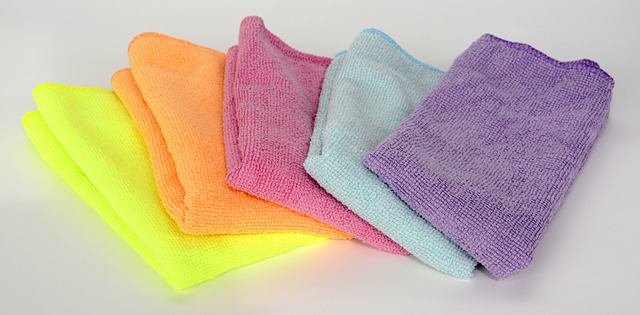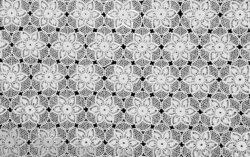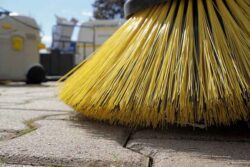
In a world increasingly aware of the environmental impact of our choices, the shift towards sustainability extends to the most mundane aspects of our daily lives, including cleaning. Enter reusable cleaning cloths—an eco-friendly alternative that not only simplifies our cleaning routines but also reduces waste and contributes to a healthier planet. This comprehensive guide explores the tenfold benefits of using reusable cleaning cloths, delving into how this simple yet impactful choice can transform our cleaning practices and align them with the principles of environmental responsibility. From cost savings to a reduced ecological footprint, reusable cleaning cloths emerge as a practical and planet-friendly solution for the conscientious cleaner.
Cleaning is a constant in our lives, and the tools we choose for this task can have a lasting impact on the environment. Reusable cleaning cloths, often crafted from sustainable materials, offer a sustainable alternative to disposable options. As we embark on a journey to discover the benefits of these eco-conscious cleaning companions, it becomes evident that their advantages extend beyond the immediate task at hand. Let’s explore the ten key benefits that make using reusable cleaning cloths a wise and environmentally responsible choice.
See also our post on Deep Cleaning Your Kitchen: A Feast for the Senses and Hygiene
Understanding Reusable Cleaning Cloths
Choosing the Right Reusable Cleaning Cloths:
When selecting reusable cleaning cloths, individuals can consider factors such as material composition, size, and intended use. Exploring options that align with personal preferences and cleaning requirements ensures a seamless integration of reusable cloths into daily cleaning routines.
Caring for Reusable Cleaning Cloths:
Proper care is essential for maintaining the effectiveness and longevity of reusable cleaning cloths. Following manufacturer guidelines for washing and drying, avoiding the use of fabric softeners, and promptly addressing stains contribute to the cloths’ durability and continued performance.
Integrating Reusable Cloths into Cleaning Routines:
Transitioning to reusable cleaning cloths involves integrating them into existing cleaning routines. Individuals can designate specific cloths for various tasks, establish a routine for washing and replenishing their supply, and gradually replace disposable options with reusable alternatives.
Educating Others on Sustainable Choices:
The adoption of reusable cleaning cloths can extend beyond individual households. By sharing information and educating others on the benefits of sustainable choices, individuals contribute to a broader cultural shift towards responsible consumption and environmental stewardship.
The Benefits of Using Reusable Cleaning Cloths
1. Reduction in Single-Use Waste:
The foremost benefit of using reusable cleaning cloths lies in the significant reduction of single-use waste. Traditional paper towels and disposable wipes contribute to landfill waste and environmental pollution. Reusable cleaning cloths, made to withstand multiple uses, offer an alternative that minimizes the environmental impact of cleaning practices. By opting for reusables, individuals contribute to the reduction of the global waste burden.
2. Cost Savings Over Time:
While the initial cost of reusable cleaning cloths might seem higher than their disposable counterparts, the long-term cost savings are substantial. Reusable cloths can withstand numerous wash cycles, eliminating the need for frequent repurchasing. This cost-effectiveness not only benefits the individual’s wallet but also aligns with a more sustainable and budget-conscious approach to household cleaning.
3. Versatility and Multi-Purpose Use:
Reusable cleaning cloths are incredibly versatile and suitable for a wide range of cleaning tasks. From dusting surfaces to wiping spills, these cloths can be used in various areas of the home. The multi-purpose nature of reusable cloths means that individuals can streamline their cleaning routines, using one cloth for multiple tasks, further emphasizing their value and efficiency.
4. Eco-Friendly Material Choices:
Many reusable cleaning cloths are crafted from eco-friendly materials such as organic cotton, bamboo, or microfiber. These materials not only offer durability but also have a lower environmental impact compared to the production of disposable paper towels. Choosing cloths made from sustainable materials aligns with the principles of responsible consumption and supports a more circular economy.
5. Reduced Chemical Dependency:
Reusable cleaning cloths often require only water or minimal cleaning solutions, reducing the dependence on chemical-laden disposable wipes. This benefit not only promotes a healthier indoor environment by minimizing exposure to harsh chemicals but also contributes to a cleaner water ecosystem as fewer harmful substances are released during the cleaning process.
6. Absorbency and Effectiveness:
The absorbent nature of reusable cleaning cloths makes them highly effective in picking up spills and cleaning surfaces. Whether tackling kitchen messes or wiping down bathroom surfaces, these cloths prove to be efficient and reliable. Their ability to absorb liquids and capture debris surpasses that of some disposable options, making them a practical choice for effective cleaning.
7. Easy Maintenance and Cleaning:
Maintaining reusable cleaning cloths is a straightforward process. Most can be tossed into the washing machine, eliminating the need for complex cleaning routines. This easy maintenance ensures that the cloths remain in good condition, ready for reuse. The simplicity of care adds to the overall convenience and appeal of incorporating reusable cloths into daily cleaning practices.
See also our post on 10 Benefits of Using Microfiber Mops and Cloths for Cleaning
8. Customization and Personalization:
Reusable cleaning cloths offer the opportunity for customization and personalization. Individuals can choose cloths in various sizes, colors, and textures based on their preferences and cleaning needs. This personal touch enhances the overall cleaning experience, making it a more enjoyable and tailored activity.
9. Contribution to a Circular Economy:
By choosing reusable cleaning cloths, individuals actively participate in the creation of a circular economy. These cloths, designed for durability and longevity, reduce the demand for the continuous production of disposable alternatives. This shift towards a circular economy supports sustainable manufacturing practices and minimizes the environmental impact of the cleaning industry.
10. Positive Environmental Impact:
The cumulative effect of choosing reusable cleaning cloths has a positive and far-reaching environmental impact. From conserving resources to reducing carbon emissions associated with production and transportation, the decision to use reusable cloths becomes a meaningful contribution to global environmental conservation efforts.
Conclusion
The use of reusable cleaning cloths goes beyond simple cleaning; it becomes a conscious decision with significant environmental consequences. The ten advantages listed in this extensive guide highlight the revolutionary effect that this small shift in cleaning practices can have. When people adopt reusable cleaning cloths, they become change agents, actively influencing a future that is more ecologically conscious and sustainable. The road to a cleaner world does not always lead to large-scale initiatives; sometimes, it begins with the tiny but significant decision to choose sustainability in our daily actions. Reusable cleaning cloths, with their numerous advantages, demonstrate the power of individual choices in creating a healthier, more sustainable plan.







